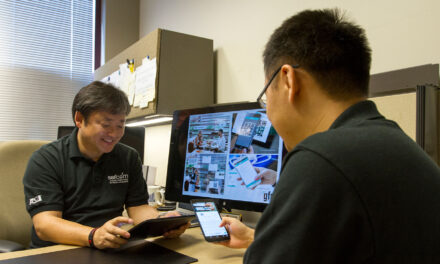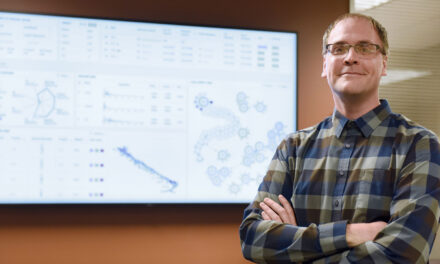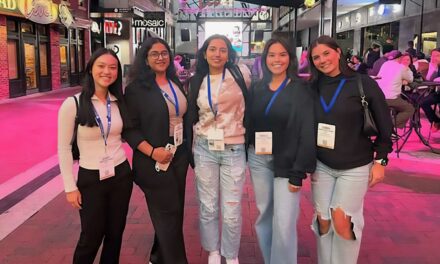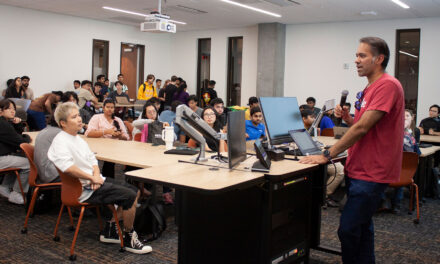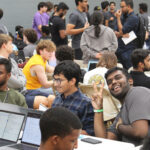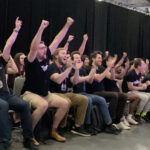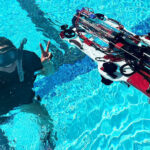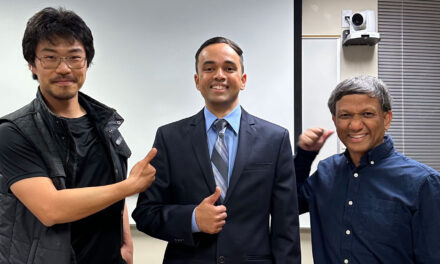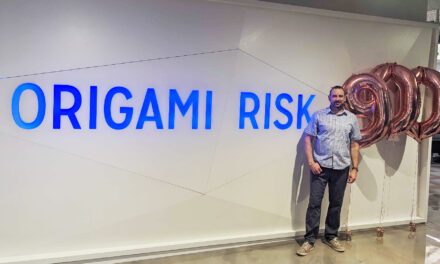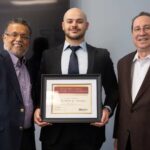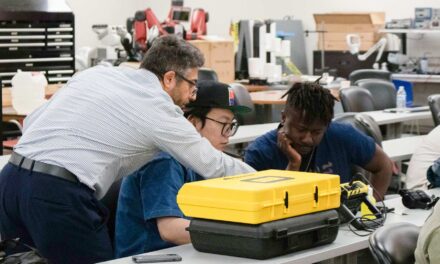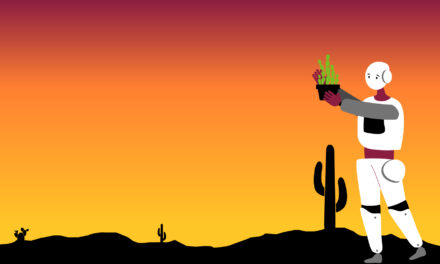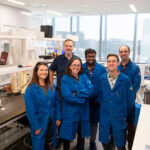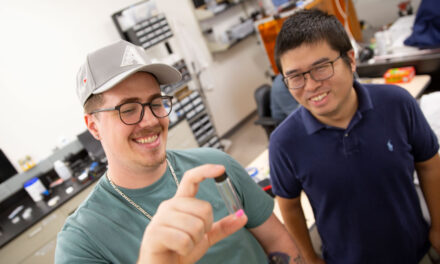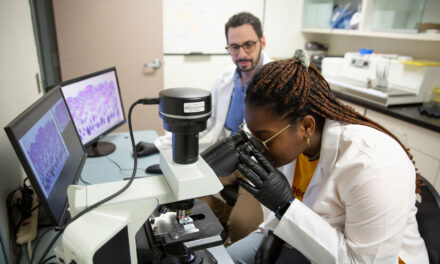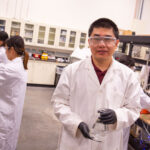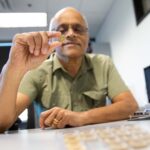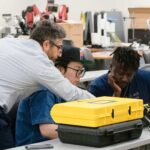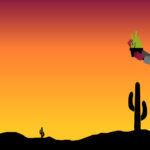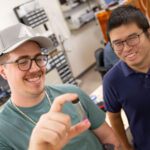
Robotics + Research + Fun = Creative Force
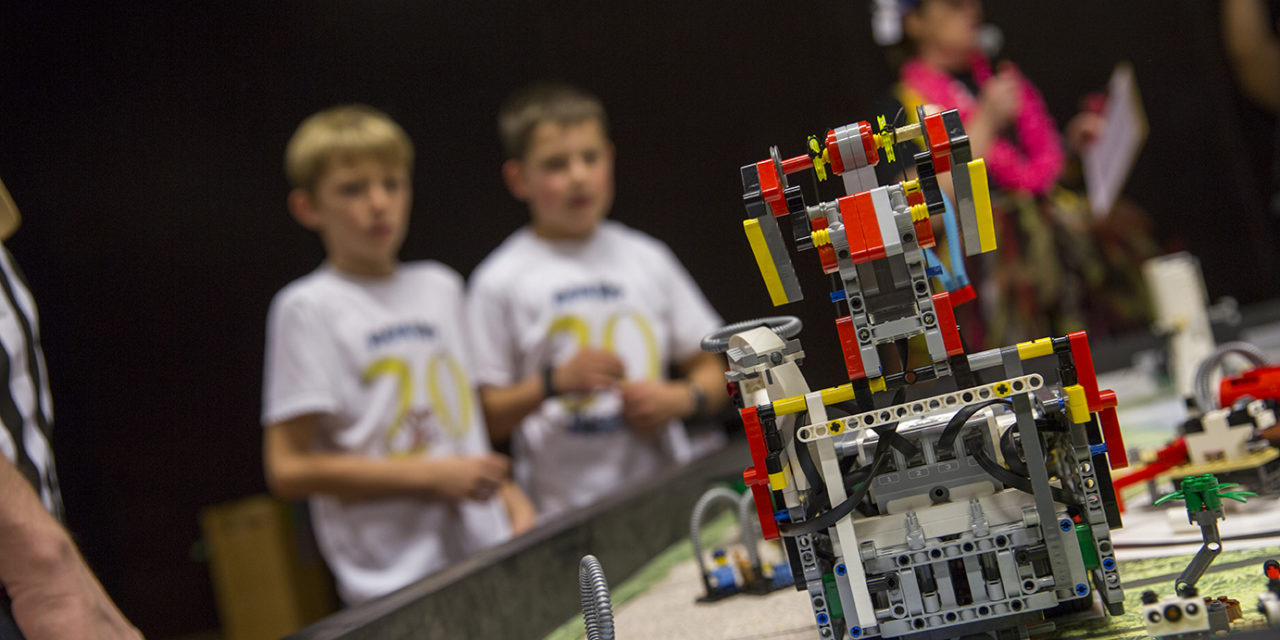
Above: Members of the FIRST® LEGO League team Monkey Rubbish 2.0 look on as their robot competes in the state championship tournament on January 15, 2017. Photographer: Jessica Hochreiter/ASU
FIRST® LEGO League tournament produces high-energy atmosphere that reflects the power of learning
If the exuberance on display at an Arizona FIRST® LEGO League state championship tournament could be converted into electricity, it seems as if it might provide a sufficient power source for at least a midsize town.
The energy at the robotics and research competition for 9- to 14-year-old youngsters was at an especially high level at the most recent annual tournament.
For the first time in its 13-year history the event was extended from one to two days — January 14 and 15. That was necessary to accommodate the record-breaking number of teams, which jumped explosively from 64 a year ago to 98 this year.
The leap reflects the continuous growth of the AZ FLL program since Arizona State University’s Ira A. Fulton Schools of Engineering took over management in 2008. It now reaches more than four times the number of students throughout the state as it did nine years ago.
Students show off emerging STEM skills
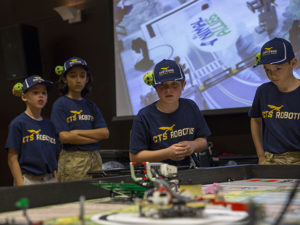
Members of the Cheyenne Roadrunners team from Cheyenne Traditional Elementary School in Scottsdale, Arizona, watch as their robot navigates the competition course on January 15, 2017. Photographer: Jessica Hochreiter/ASU
The teams that earned their way to the state tournament were among more than 350 that participated in AZ FLL activities in the past year and competed in local and regional qualifying tournaments leading up to the championship event.
The result was more than 600 students— along with team coaches, mentors and students’ parents — creating a buoyant and at times frenetic scene for the two days on ASU’s Tempe campus.
Teams demonstrated how they’ve learned to apply their budding comprehension of the principles of engineering and science to the design, construction and programming of miniature robots made from LEGO MINDSTORMS robotics kits.
Equally as important as the performance of their robots, students are judged on the results and presentations of their research projects, for which they must develop technology-based solutions to real-world challenges.
Focus on teamwork and the value of learning
FIRST® (For Inspiration and Recognition of Science and Technology) is an international organization founded by renowned inventor Dean Kamen. It develops and supports programs to motivate students to pursue opportunities in STEM fields (science, technology, engineering and mathematics).
FIRST® puts strong emphasis on “core values,” evaluating teams in FLL competitions on how their work demonstrates teamwork skills, respect for fellow competitors, friendship and appreciation for learning, and on how they share their discoveries with other students and their local communities.
This year’s research project theme was Animal Allies, which tasked students to come up with ways to improve the interactions of humans and animals for the betterment of all species involved.
That theme sparked some creativity, particularly in continuing the AZ FLL tradition of many teams giving themselves names and wearing costumes related to the research theme.
The festive atmosphere during the tournament was enhanced by youngsters wearing hats, shirts and other apparel depicting sharks, alligators, crocodiles, wolves, owls and chickens, among other types of pets and wildlife.
Students dive deep into research projects
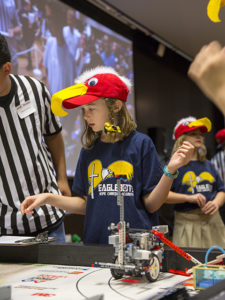
Members of the Eaglebots team from Hope Christian Academy in Chandler, Arizona, prep their robot’s first run at the FIRST® LEGO League state championship tournament on January 15, 2017. Photographer: Jessica Hochreiter/ASU
The research theme also inspired some fervent research explorations in attempts to develop viable solutions to serious problems.
The Gold Eagles team from Phoenix Country Day School sought to help find ways to reverse the trend of colony collapse disorder that is decimating bees by the millions around the world.
Eighth-grader Darwin Harriss explained how the team delved deep into the issue. They learned the extent of the threat posed by the massive loses of bees that pollinate about 80 percent of the Earth’s plant life, and how that could severely hamper crop production and deplete humans’ food sources.
When they had questions after finding out all they could on their own, they “went right to the source,” Harriss said. They contacted one of the leading experts on the crisis, a Harvard University professor.
“We explained who we are and what we were doing, and sent him some questions, and he answered them all,” Harriss said.
The Gold Eagles discovered that technology would be only part of solving the problem.
“We found out we would also have to lobby politicians and raise public awareness,” Harriss said.
Helping birds to fly and dogs to feel safe
The Local Legends Unleashed team from the Catalina Foothills School District in Tucson turned to some of the latest advances in 3D printing to try to help birds recover their ability to fly after breaking a wing.
Team members gathered information from a local veterinarian and a wildlife rehabilitation center to pursue a solution.
Wesley Chiu, a high school student at Basis Tucson North school, explained how he and his Legends teammates used polylactide — a strong, light-weight and biodegradable material that can be 3D printed — to form a type of splint that could be custom-fit to a bird’s broken wing.
“And,” Chiu added, “it only costs three dollars.”
The Phido Phobia Phighters from the Catalina Foothills School District took on the challenge of finding ways to prevent “storm phobia” in dogs that get fearful or become panicked by thunder and lightning.
Clean water and traffic safety for wildlife
A team from Centennial Middle School in Yuma focused on dams and how some of them cause build-up of stagnant water that is prone to become contaminated and thus pose a health threat to wildlife.
Eighth-grader Florencio De La Torre described his team’s design for a solution: “water wheels” that would move continuously to keep water flowing to prevent contaminants from forming.
Twelve-year-old Sofia Chacon and her two best friends, fellow students at Washington Elementary School in Winslow, made up the FLL team named Girls Just Want To Have Fun.
They fashioned a prototype for a device that automobile drivers could use to avoid driving into elk and other wildlife that roam the rural and forested stretches of northern Arizona.
“The device makes a noise that would make animals not want to come close to traffic,” said Chacon, who described herself as “an animal lover” with five dogs at home.
The Lugnuts from the Mesa Academy for Advanced Studies in the city of Mesa, a team of four girls, worked on ways to prevent dogs from getting motion sickness while riding in automobiles.
The solutions included wearable technology that helps to keep a dog’s body temperature cool, and the use of some aroma therapy to calm the pets.
More than just developing technical skills
Russell Harris, a systems and software engineer at General Dynamics, has coached various versions of The Lugnuts over the past eight years. He’s also a member of an AZ FLL council whose members advise FLL teams around the state on how to do community outreach — something encouraged by the FIRST® organization.
“I love the values FLL teaches, and sharing what you learn with others is a big part of that,” Harris said. “What I hear from teachers about students who’ve been in FLL is how those students show confidence in standing up in front of people and presenting their ideas.”
What students get from the program “goes far beyond skills in robotics,” he said. “They learn the things that make industries successful. They know how to work with other people to accomplish things. FLL builds skills that will enable this generation to do great things in any kind of career they get into.”
All about overcoming obstacles
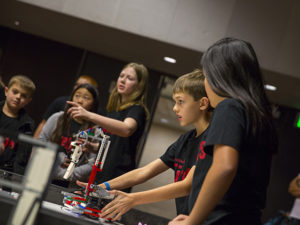
Team members of the Firebots hailing from Scottsdale, Arizona, line up their robot’s route at the FIRST® LEGO League state championship tournament on January 14, 2017. Photographer: Pete Zrioka/ASU
Others who volunteer their time and efforts to AZ FLL said the same.
“In the robotics and the research, these kids calculate, they strategize, they analyze problems and solutions. They learn how to resolve issues between team members,” said Mark Pond, who served as a team coach for four years for a Mesa Academy team his daughter joined. He now also does seminars for new AZ FLL coaches and is a judge for tournament competitions.
Pond said he watched his daughter and her teammates mature during their participation in the program.
“They developed a work ethic. They learned time management,” he said. “By the time they were in the eighth grade they took over. They didn’t need me to coach them. They knew what to do, and they dazzled the judges.”
Scott Gray, an electrical engineer at Honeywell for more than 30 years, coached teams that his two sons were on for several years. Those teams won four state championships as well as additional awards national and international FLL competitions.
His eldest son is now in college studying chemical engineering. One teammate is at the U.S. Military Academy at West Point and another is at an Ivy League college.
The combination of robotics technology, research into real-world problems and the core values make FLL unique, said Gray, who now serves as head referee for the state tournament and also as a member of the AZ FLL council.
“I love it, because it’s all about them learning how to overcome different kinds of obstacles,” he said, “but it’s also about having fun, too.”
Fun is key to the education process
Charlotte Ackerman, the teacher leader for science and engineering practices for the Catalina Foothills school district in Tucson, has coached 78 robotics teams in the past 13 years, including three state championship teams.
She has twice received the AZ FLL Coach of the Year award and also the Coach of the Year Award at the FLL World Festival. She coached 10 teams in the past year, four of which got to the state tournament.
She agrees that the fun part is essential to what makes FLL work.
“Robots are fun, they attract the youngsters and those students stick with it because they want to make those robots work,” she said. “But at the same time they are having fun trying to do that, they are learning things that will make you successful in whatever you do. And for those who become passionate about it, this is one of the defining experiences of their lives.”
Competitive program has evolved into a community
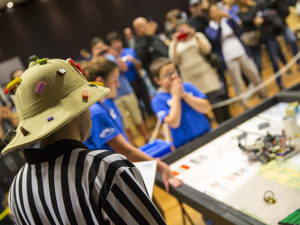
A volunteer judge wearing a safari hat decked out with LEGO bricks watches as teams compete at the FIRST® LEGO League state championship tournament on January 14, 2017. Nearly 80 ASU student and staff volunteers helped with the recent championship tournament which was held on January 14–15, 2017. Photographer: Pete Zrioka/ASU
AZ FLL is also successful because it has evolved into “one big family” of coaches, mentors, teachers and parents uniting to support the students, Ackerman said.
Many of those students themselves have become part of the AZ FLL community after their years in robotics competitions.
Danielle Mara, an ASU freshman electrical engineering student, was among the nearly 80 ASU student and staff volunteers who helped with the recent championship tournament. Mara also served as a competition judge and recruited others students to become volunteers.
While in high school in Scottsdale, Mara said her participation in the FIRST® Robotics Competition program for high school students “helped me get directed and be more outgoing and more confident about my abilities. And it opened me up to the possibilities of engineering as a career.”
She wants to “give back some of what I got” from robotics competitions, she said, “and give the kids opportunities I wish I had gotten at a younger age.”
Candace Manygoats, a member of Navajo Nation, has spent some of her year working with the Americorps Vista volunteers program helping to get students from underprivileged communities and Native American communities in northern Arizona connected to the AZ FLL program.
FLL, she said, “can give kids the feeling that they belong to something. That will build their self-confidence. Not all robotics competitions or educational programs do that.”
Siblings in step with engineering interest
For John Farbarik, AZ FLL has become family affair.
Farbarik earned a bachelor’s degree in math education and a master’s degree in decision information systems at ASU in the 1980s and went on to a long career in the food industry.
His 13-year-old son, Joshua Tint, is a member of the Local Legends Unleashed from Catalina Foothills School District in Tucson. This was Josh’s fourth year on an FLL team and third year at the state tournament.
Farbarik’s older son, Jackson Tint, 16, now a high school sophomore who went to the state tournament with an FLL team last year, served this year at the tournament as a robot design judge.
Farbarik’s 10-year-old daughter, Samantha, joined her first FLL team last year. The team didn’t make it to the recent championship event, but she joined her brothers there to get a first-hand look at the competition in preparation for future robotics endeavors.
“Her older brothers encouraged her to try it,” Farbarik said. “Now she says she wants to be an engineer.”
As do his sons, he adds.
FLL offers “the best way to learn,” he said. “They’ve been getting introduced to all kinds of basic engineering techniques and concepts. But to them it feels like they’re playing and doing something they want to be doing. FLL seems to be working quite well for us.”
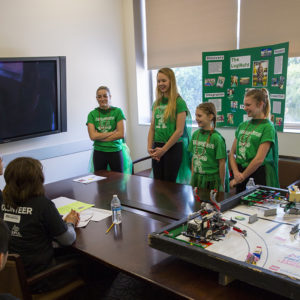
The Lugnuts, a team from Mesa, Arizona, give their Core Values presentation at the FIRST® LEGO League Arizona state championship tournament on January 14, 2017.
- 1st Place
- The Lugnuts (Mesa)
- Bee Inspired (Phoenix)
- 2nd Place
- Local Legends Unleashed (Tucson)
- Eagle Bots (Chandler)
- 3rd Place
- Catholic Master Builders (Chandler)
- Technical Difficulties (Mesa)
Robot Design Awards
Robot Performance Award
- 1st Place
- Local Legends Unleashed (Tucson)
- Galaxy Quest (Flagstaff)
- 2nd Place
- Eagle Bots (Phoenix)
- RoboPeeps (Phoenix)
- 3rd Place
- Los Perro Roboto (Phoenix)
- Monkey Rubbish 2.0 (Phoenix)
Robot Programming Award
- Robot Raiders (Queen Creek)
- Monkey Rubbish 2.0 (Phoenix)
Mechanical Design Award
- Los Perro Roboto (Phoenix)
- Galaxy Quest (Flagstaff)
Strategy & Innovation Award
- Varmint Vigilantes (Tucson)
- Lightning Bots (Scottsdale)
Project Awards
Research Award
- 1st Place
- Benchmark Bobcats (Phoenix)
- Grace LEGO Warriors (Phoenix)
Presentation Award
-
The Six Musketeers (Chandler)
-
Vertebricks (Chandler)
Innovation Solution Award
- Firebots (Scottsdale)
- Queen Bees (Mesa)
Core Values Awards
Inspiration Award
- RoboPeeps (Phoenix)
- Cheyenne Roadrunners (Scottsdale)
Teamwork Award
- The Snoopies (Yuma)
- Eagle Bots (Chandler)
Gracious Professionalism Award
- Girls Out Loud (Chandler)
- Highland Lakes Renaissance Robotics (Mesa)
Coach/Mentor Awards
Young Adult Mentor Award
- Nic Ardevin and Evin Harris (The Lugnuts, Mesa)
Adult Coach/Mentor Award
- Russell Harris, (The Lugnuts, Mesa)
- Anna Prakash, (Red Pandas, Mesa)
Judges Award
- Beep Patrol (Litchfield Park)
- Si Se Puede 6 (Phoenix)


